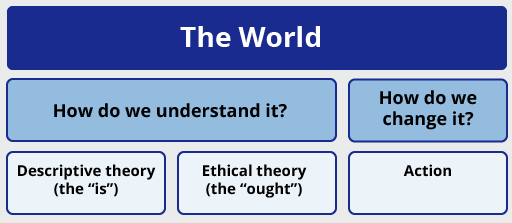Use 'Print preview' to check the number of pages and printer settings.
Print functionality varies between browsers.
Printable page generated Thursday, 19 February 2026, 7:24 PM
Unit 6: Fostering ethical learning environments
Unit 6: Fostering ethical learning environments
The E4J University Modules on Anti-Corruption, Integrity and Ethics provide materials and pedagogical tools to help you teach classes on a variety of ethics topics.
However, effective integrity education requires going beyond the mere teaching of ethical theories and anti-corruption topics; it requires a supportive ethical learning environment. Experiencing an ethical environment while at university enhances the moral sensitivity and ethical behaviour of students and helps them appreciate the importance of ethics in their personal and professional life and in society more broadly.
In addition, when the values and messages emphasized in classes addressing ethics and anti-corruption issues are consistent with those that prevail outside of the classroom, they are more likely to be considered valid by the students.
Thus, an ethical environment is not only important as an educational method on its own right but is also crucial for the effectiveness of ethics classes and courses, including those based on the E4J Modules.
Watch this video which provides an overview of the importance of ethics education as a foundation for ethical conduct.

Transcript
6.1 Setting ground rules for ethical behaviour
How should students behave in the classroom? Are they allowed to eat, to use electronic devices, what language can be used during class deliberations? How should you behave when dealing with class interruptions, when answering students' mails, when addressing questions during classes?
These are all routine questions that arise during each course in almost any country or field of education, and all of them involve ethical issues.
Examples of unethical student behaviour are well-known, and you will have experienced many of them yourself: arriving late for class, using mobile phones or computers for non-educational purposes in class, engaging in corrupt behaviour such as cheating in exams and plagiarizing the work of others.
Universities are constantly trying to address this behaviour through increased vigilance (e.g. plagiarism software) and disciplinary procedure, but while this might prevent some corrupt or unethical behaviour from occurring, it rarely has a lasting impact.
Activity 6.1 Ground rules 
6.2 Lecturers as ethical role models
Actions speak louder than words. Ethical behaviour can foster ethical learning among students more effectively than merely teaching ethics in isolation. “How you teach” is equally important to “what you teach”, especially when teaching anti-corruption, integrity and ethics.
Lecturers, by the very nature of their job, set an example for their students and should ideally serve as role models of ethical behaviour within and beyond the classroom and the requirements of their employment contracts. Lecturers who teach ethics should be especially committed to serving as ethical role models, as this is critical for the credibility and effectiveness of their courses.
In other words, to create a favourable environment for teaching on ethics and values, you must demonstrate integrity in your daily practice at the university and limit opportunities for corrupt or unethical behaviour towards students, fellow lecturers, and the administrative staff (Hallak and Poisson, 2007).
Activity 6.2 Role models 
a.
Starting and finishing classes on time.
b.
Not being available for meetings with students after agreeing to be there.
c.
Dealing with interruptions and distractions in class in an appropriate manner.
d.
Facilitating class discussion in a way that demonstrates respect for different opinions.
e.
Misplacing students’ assignments.
f.
Not taking advantage of your professional relationship with students for private gain.
g.
Grading in a timely fashion and providing comprehensive feedback to help students learn and improve their skills.
h.
Giving undue advantage to some students simply because of who they are.
i.
Answering emails and other messages from students promptly and respectfully.
j.
Performing assessments of assignments and tests in a fair way.
k.
Demonstrating empathy and understanding to students in difficult circumstances.
l.
Delivering a class without proper preparation.
The correct answers are a, c, d, f, g, i, j and k.
Answer
A mapping of possible misbehaviours at higher education level can be found on the online ETICO resource platform.
6.3 Developing ethical learning environments
In this video Dr Nceku Nyathi, Lecturer in Business, reflects on his experience of developing ethical learning environments when using the E4J resources with his students in South Africa and the UK.

Transcript
6.4 The role of theory
You have been introduced to a variety of teaching principles in this Module which will help you deliver engaging and effective anti-corruption, integrity and ethics learning opportunities for your students. In doing so you have been introduced to a number of ethical theories. In this section you will explore the nature and role of ethical theories in more detail and consider how they are used within the E4J Integrity curriculum.
The moment we – as human beings – express a desire about the way something should be, we use ethical language. By suggesting that something should be different, we are doing the grading, evaluation and comparison (Newman and Blackburn, 2002, p. 4). We suggest that something could be better, and by implication we support the idea that some things are better, more desirable or more acceptable than others.
The illustration below explains the role of theory – it helps us to understand the world, but theory by itself cannot change the world; we need action. Action – and hopefully ethical action – will be informed by theory. Any theory that addresses the way things should be or ought to be – as mentioned above – can be classified as an ethical theory.
The E4J Anti-Corruption, Integrity and Ethics Modules address three of the major Western ethical theories: utilitarianism, deontology and virtue ethics. The critical contribution of non-Western philosophy is acknowledged but not addressed in detail in this online training course (although some Chinese ethical theories are briefly discussed).
Modules in the E4J Module Series on Integrity and Ethics that discuss non-Western approaches to ethics include Module 2 (Ethics and Universal Values), Module 4 (Ethical Leadership), and Module 5 (Ethics, Diversity and Pluralism). It is noted that the approach known as ethics of care, while not discussed in this training course, is defined and addressed in Module 9 (Gender Dimensions of Ethics).
No best theory
The E4J Modules do not seek to promote one particular ethical theory. All major ethical theories have strengths and shortcomings. There is no confirmed “best theory” and individuals are encouraged to develop their own preferences and make their own choices.
Theories provide assistance
All the theories presented in the E4J materials can be considered together to provide assistance to make a specific choice. Often instinctive choices are made without reference to an ethical theory, although this could perhaps be best explained by virtue ethics. One risk is to make a predetermined choice about a preferred action, and then to find an ethical theory to justify a decision. Such an approach lacks consistency and, hence, also lacks integrity.
6.5 Conclusion

The E4J Modules have been designed to support you in delivering varied, engaging and impactful anti-corruption, integrity and ethics education. However, they will be most effective if adapted to your particular teaching context, as will be discussed further in unit 7.
Go to Unit 7: Module adaption and delivery now.


